Editor’s note: Sun Journal Staff Writer Christopher Crosby participated in the annual Maine Outdoor Challenge in Freeport Monday. Below is his first-person account of the competition.
FREEPORT — The instructors were unanimous: Holding a shotgun aloft while terrified wasn’t a recipe for success.
Behind me, as others waited their turn at the target-shooting range, it seemed that to have the faith to hand strangers a gun for their first time, the placid instructors must have made peace with terror years ago.
At the Maine Outdoor Challenge on Monday, the ranks of boardroom executives were making their way through a crash course in target shooting, archery, fly-fishing and GPS-locating in a competition of sporting discipline and fundraising.
The goal wasn’t to make novices into experts — though the Merrill Lynch group carried a reputation for proficiency — but to give a comfortable outdoor experience to people donating a lot of money to a good cause, according to Portland Rotary Club President Kris Rosado.
“I’d say 50 percent have never held a shotgun before,” Rosado said.
The annual three-day event put on by L.L. Bean is expected to raise $60,000 for the Boy & Girls Club sof Southern Maine and Portland Rotarians.
It was pouring rain and cold. Rosado, who was not in the field but was speaking from somewhere much warmer and drier, drolly suggested, “There’s no bad weather, just bad clothing.”
We arrived at a field ringed with green trap machines, like miniature missile silos. There was a dry run: A man produced a numbered remote control, pressed ‘1’, and told me to aim at an orange clay Frisbee — properly known as a clay sporting target — and hit it. My self-esteem quaked at his confidence.
Before I could disappoint him, I was whisked away for a safety course. Waiting their turn, a group of women, their groggy faces just visible within the hoods of their brightly colored parkas, wore looks of brittle cheeriness that seemed on the brink of mutiny.
Instructor Mike McManus had me don lime-green earplugs and sporty safety glasses as he launched into a practical safety course: The barrel always remains over a wooden bar and in the opposite direction from the living things behind me, which I consider a conscientious tidbit to avoid a ride to southern Maine’s medical facilities.
Because the safety is off — you could call for a target and forget it’s on — McManus told me to keep my finger away from the trigger by placing it along the side of the gun, renewing waves of nervousness.
“A shotgun was made for your face,” McManus said.
With the gun tucked into my shoulder and nuzzled against my check, he explained the mechanics of shooting: Follow the target with your finger and at the apex of its flight, fire. Boom, broken pottery.
I yelled “pull” and watched the target fly in a parabola. I pressed the trigger and closed my eyes at the same time, not registering the noise as I looked up in time to see something like a swarm of huge mosquitoes cruising in formation recede at 1,200 feet per second into a gray sky.
McManus didn’t look surprised that I had missed, though he smiled slightly when I reloaded too enthusiastically and sent the spent cartridge whizzing over my shoulder.
“Ignore the gun, point with your finger at the target and when I say, ‘Shoot’, pull the trigger,” he said.
I missed again. We swapped the 12-gauge for a longer 20-gauge, and finally, on the third time, a hit, three pieces falling to the ground writing “victory” in the language of my heart.
We retraced our steps to the archery station, where Pete Lamarre was toweling down a handful of recurve bows. After a short eye test he gave me an arm and finger pad and had me compare arrows to my arm length so I didn’t inadvertently pierce the back of my hand.
I lined up parallel to the target and opened my feet, slightly facing the target. Reaching below the fletching with three gloved fingers, I picked up the arrow, fit it below the knock point locator, a small metal nub the arrow rests against, and closed my left eye.
At this distance, we were “gap shooting,” aiming about 14 inches below bull’s-eye to account for a hop the arrow would take. Holding the bow in my left hand so the grip created a small pocket with my palm, I drew back, my pointer finger now touching the corner of my lips, and leaned my head in so my nose rested against the taut string.
I took a steadying breath. I let my three fingers go, drawing them across my cheek to my ear. It was almost a caress. Thunk!
My first three arrows hit the target in a way that made me reluctant to follow Lemarre’s next suggestion: Try again. It went a bit worse, but he looked pleased.
Nearby, Craig Uecker was waiting serenely to teach a four-part fly cast, the mastery of which is a potent tool for trout fishing on streams and rivers.
He compared it to throwing a dart, and had me practice a back-cast, slowly lifting the reel and then suddenly snapping it straight, repeating the movement to send it forward again.
My casts weren’t that straight, making a mess of the line. A strong whipping noise — the kind I was making — is the sign of a bad cast; the movement should make a soft sound, and to prove his point he made a noise like a summer breeze in the treetops, slowly rocking the reel back and forth. Somewhere a fish was lulled to sleep.
“If I didn’t cast, I’d probably have to spend money on therapy,” Uecker said.
But I’m far from Zen, and I’ll need it anyway.
The top fundraising team competing in the 2015 Maine Outdoor Challenge was the Five Amigos, raising $2,195 to support the Portland Rotary’s 3-H project in the Dominican Republic and the Boys and Girls Clubs of Southern Maine. The six members are Bruce Moore, Jerry Angier, Roger Fagan, Dick Giles, John Houghton and Don Lowry.
Moore, of Cape Elizabeth, was named the top individual fundraiser, raising $700 for the charities. According to Moore’s fundraising page, he and his wife, Jan Chapman, have been to the Dominican Republic four times as volunteers helping to provide hearing aids, prosthetic hands and clean water.
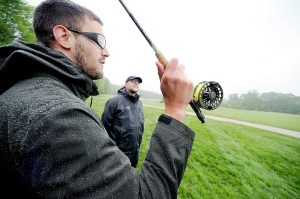
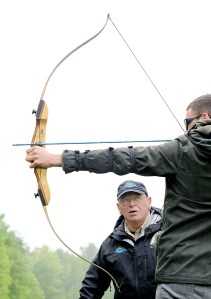
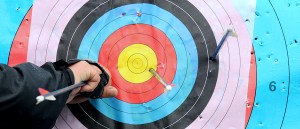
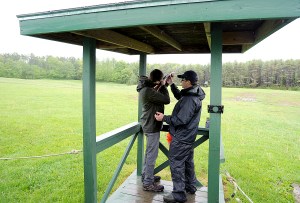
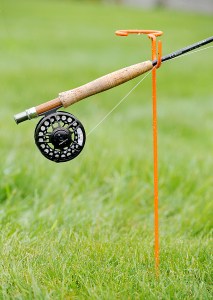
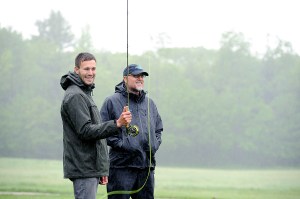
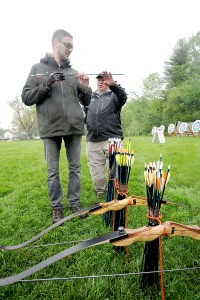
Comments are no longer available on this story